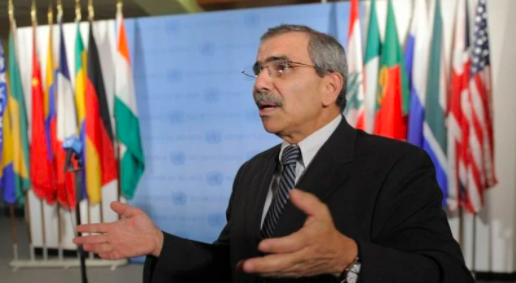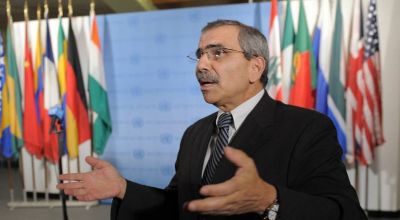
Former Lebanese Ambassador to the UN Nawaf Salam. (Credit: Stan Honda/AFP)
While former Prime Minister Saad Hariri suspended his political career one month ago, ambiguity continues to prevail over the Sunni landscape. All ears are now turned towards former Prime Minister Fouad Siniora, who is scheduled to break his silence in a press conference on Wednesday.
Former ambassador and permanent representative of Lebanon to the United Nations, and judge on the International Court of Justice, Nawaf Salam, is undoubtedly the sole Lebanese figure who can say he has garnered support from both the opposition emanating from the Oct. 17, 2019, protest movement and a part of the traditional political class, as well as the West and Saudi Arabia.
Salam, whose name was once floated as a potential prime minister, is different from any other in Lebanon’s political landscape. What makes him so unique is that he is being encouraged to run in the May 15 parliamentary elections by both the thawra [revolution] and Sunni establishment.
L'Orient-Le Jour learned that Salam met with several civil society groups, as well as Siniora and former MP Salim Diab during his recent visit to Beirut. They all advised him to run in the elections and to stand as head of list. However, the former ambassador still has not come to a decision on whether or not he will run.
“I am not running in the parliamentary elections for any personal interest. It is important to have a political program and a well-defined project that would inspire the confidence of the Lebanese,” Salam told L’Orient-Le Jour.
In case the former ambassador decided to do so, he is most likely to run in the Beirut II electoral district, where Hariri’s withdrawal created a huge void.
“Nawaf Salam is the only figure capable of serving as a point of convergence between the thawra forces and the Sunni public,” said a leading Sunni figure, who declined to be named.
The judge could win the support of pro-Hariri voters, after the Future Movement’s list gained a dominant position and won six of the 11 seats in the district in Lebanon’s last electoral contest in 2018.
“My candidacy hinges on a clear political project at the national level,” Salam reiterated.
Hariri stepping down from political life nearly a month ago has left the Sunni public confused.
When he returned to Beirut recently to pay his respects at the grave of his father Rafik Hariri, Saad Hariri did not express any intention to back any political figure or group.
In this vein, there is a serious risk of weak turnout among the Sunnis, which could turn out to be beneficial for Hezbollah.
“In order to encourage them to vote, we must first give them a ray of hope by having a project,” Salam said.
The project in question is conditioned on a general understanding of what the post-Hariri withdrawal stage should resemble for the Sunnis. In case they wish to run for elections, the Future Movement’s MPs are required to resign from their party.
Simultaneously, many are the forces who seek to fill the void that Hariri left behind, including independent figures such as MP Fouad Makhzoumi, or even Hezbollah.
‘Hariri does not support his step’
Everyone is eager to hear Siniora, who is scheduled to hold a news conference on Wednesday. According to information obtained by L'Orient-Le Jour, Siniora met with Hariri in the UAE, where he told him that he had already started to form an electoral coalition.
Siniora is holding regular meetings with some Sunni figures who were once close to Rafik Hariri. They include former ministers Khaled Kabbani, Ahmad Fatfat and Hassan Mneimneh, as well as former MP Ammar Houri, and other figures.
The coordination meetings are designed to delineate a political line that champions international and Arab League resolutions and that opposes Hezbollah and its policies.
Siniora has made no decision on whether he will stand as a candidate in the election, and is unlikely to speak about that at the press conference. Yet, he wants to define the criteria for Sunni candidates, and to wait for the reactions that this event will spark before making his final decision.
“Siniora’s main issue is that his step lacks support from Hariri,” said a source close to Rafik Hariri’s son, on condition of anonymity.
“Hariri does not want to see anyone filling his political space. He wants to show the Saudis that it is either him or no one,” said an anti-Hariri heavyweight Sunni figure.
These considerations could create a hurdle that could avert the formation of a large front in which Nawaf Salam would be a star.
“Elections are not the end of the world, and not standing for election does not imply stepping down from politics,” said the former ambassador, as if he is insinuating that he could be a candidate for the post of prime minister, following the elections. If, of course, they are held on time.
This article was originally published in French in L'Orient-Le Jour. Translation by Joelle El Khoury.
